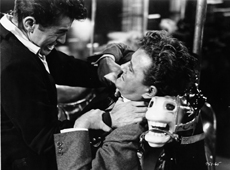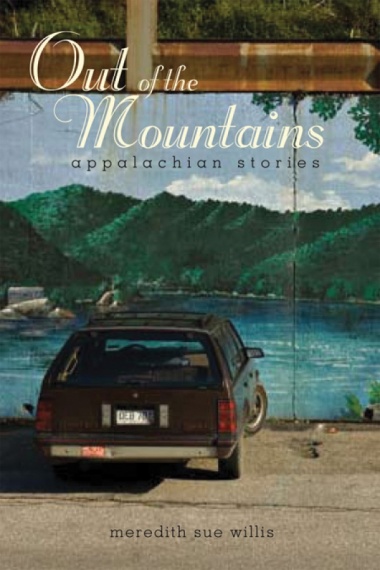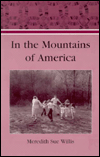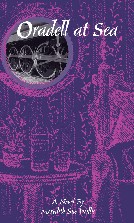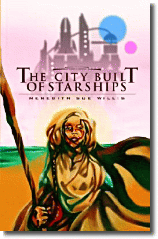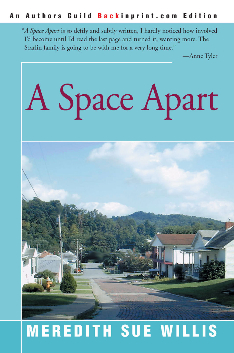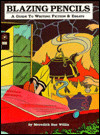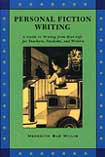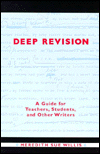Writing Exercises 61 - 80 are on this page.
Exercises 1- 20
Exercises 21- 40
Exercses 41 - 60
Exercises 61-80
Exercises 81-100
Exercises 101 - 120
Exercises 121 - 140
Exercises 141 - 160
Exercises 161 - 180
Exercises 181 - 200
Exercises 201 - 240
Exercises 241 - 260
Exercises 261 - 300
Exercises 301 - 330
Exercise #61
Think of a common cliché or stereotype and write a passage in which you describe a time you heard it used, or write a scene in which a character uses it. Then--have something humorous or serious happen-- an action-- that is the opposite of the cliché or stereotype: the early bird doesn't catch the worm or the old man is demonstrably not set in his ways....
Exercise #62
Dan Wiencek has written a sort of parody of writing assignments called "Thirteen Writing Prompts" in McSweeney's (See it here). His prompts may be back formations from recent fiction that I mostly don't recognize. Here's our prompt: think of the worst writing prompt you've ever been assigned or heard of, and try writing it to see if you can make something genuine from it, whether serious or funny or something else.
[Exercises #63, #64, and #65 all use the same set up, but go in different directions...]
Exercise #63
.
You have often passed a particular house (or first floor apartment) as you walk to the train or drive home from work. This particular evening it is just past dusk so that there is still a little deep blue color to the sky, but all the lights are on in the house/apartment/place you notice. Something makes you stop and look.
Suddenly, in one of the windows, you see....
Exercise #64
.
You have often passed a particular house (or first floor apartment) as you walk to the train or drive home from work. This particular evening it is just past dusk so that there is still a little deep blue color to the sky, but all the lights are on in the house/apartment/place you notice. Something makes you stop and look.
Looking in the window, you can see rooms and pictures on the wall, furniture. It seems strangely family. Suddenly you are in the room, and it is a room you have been in so many times....
.
.
.
Exercise #65
.
.
You have often passed a particular house or apartment as you walk to the train or drive home from work. This particular evening it is just past dusk so that there is still a little deep blue color to the sky, but lights are on in the house/apartment/place. Something makes you stop and look. It reminds you of Magritte's famous painting, Empire of Light.
The reversal of dark and light sends you into a reverie, and you remember....
.
.
.
.
.
.
Exercise #66
Write in a different place: Take your laptop or your yellow legal pad out on the back porch .....
Exercise #67
.
Everyone has a first day of school story, or first day at a new school, or first day at college. Write yours in whatever way it comes to you. Now write it again from different point of view-- yourself as it was happening, your mother, from the point of view of the teacher looking out at your class's shining first grade faces, whatever. Of course, the change is likely to make it into fiction-- that is to say, if you are imagining someone else's mental landscape, you are writing fiction..
.
.
Exercise #68
.
A character or yourself enters a crowded room. Write it twice, once with a fairly objective description of what is there, then again with the person under some kind of stress– confused by the voices, trying to find an important person in the room...
.
Exercise #69
Put a conure parrot in your story. Perhaps someone goes into the apartment of a friend or lover who owns a conure, or goes into a pet store-- or perhaps the person dreams of parrots. If you are looking to start something new, write a prose or poetry "Ode to a Conure."
.
.
Exercise #70
.
Write a dialogue between an older and a younger person. Have the adult express the idea that some activity is not "right" for the young person-- or that the young person is not "right" for the activity. You might take something from your own childhood-- when you wanted to, say, learn to play the piano and were told your hands were too small. Or, perhaps your sympathies are with the older person: the young person wants to move in with his or her beloved and you think it is the wrong thing to do. Give the actual speeches the people make, their gestures, and the setting where the dialogue takes place.
.
Exercise #71
Someone wakes up in a strange place. The person observes the place in some detail, then begins to piece together how this happened...
.
Exercise #72
This exercise has two parts, and is about the many possibilities that can come from one idea:
(1) Write a narrative of an incident from real life that happened to you or that your observed. This works best if the incident has a conflict.
(2) Write the same narrative again as fiction. Keep in mind that fiction can be as simple as changing the color of the participants' tee shirts or including the thoughts of someone other than yourself. What happens to the incident in fictional form? You might do these two writings on two different occasions..
Exercise #73
IHalloween challenge: write a scene or anecdote with Halloween in it-- but never use the word "Halloween."
This could be a cheerful childhood memory, or a moment in which a person is frightened (as I was in New York City last year on Halloween after teaching when the streets were overflowing with people who had been at the yearly parade in the Village. I was almost crushed by an enormous man wearing enormous platform heels and an enormous beehive wig-- it was exciting but also more than a little frightening).
Your piece could also include historical material such as the times when Halloween was the occasion for horrific pogroms against the Jews in Central Europe.
.
.
Exercise #74
Write a Novel this November. Take a look at National Novel Writing Month Website and learn how.
.
.
.
Exercise #75
It is the birthday of someone important who has died. This person is famous or someone you know personally. You or, if you're writing fiction, a character writes a letter to the person.
.
.
.
Exercise #76
.
The two men are having a disagreement over...(To find out the source of this image, click here)
Exercise #77
A person is running. Do three things: describe the action of running; tell how it feels to the runner; tell what the person is thinking about as he or she runs. The person could be you when you were a child and ran for pleasure; it could be a character running from danger. It could be someone running to catch a train or a plane.
Exercise #78
Observe and describe at considerable length a person's clothing. This may be a memory or made up, but in any case, be exhaustive, including wrinkles, loose threads, description of the pattern in the tie, a spot of mustard. Try to write at least a long paragraph of description. What do you learn about the character or theorize about the personality from the clothing?
Exercise #79
Try this challenge: pull out something you're been writing (a poem, a journal entry, a novel) and put an orange in it. Make the orange part of the thing you're writing, but keep in mind that the orange might appear in a painting or a dream. Remember a particular orange you once encountered-- saw squashed in a gutter or sitting perfect and fragrant on someone's dining room table.
Exercise #80
He is looking out the window. Everything is gray. What does he see? What is he thinking? What will he do next?
Exercise #81
Write about something embarrassing that once happened to you (or, if you're writing fiction, to your main character). Write it once as a cheerful letter or email to someone who you (or your character) doesn't want to know how painful it was: make this version humorous or light. Then write a journal or interior monologue version in which it is explored more fully and deeper.
Alfred Hitchcock's Strangers on a Train
Subscribe to Meredith Sue Willis's
Free Newsletter
for Readers and Writers:
Send email to MSW
New Book Deal!
Special Price on Meredith Sue Willis's new book of stories from myths and other stories: Re-Visions. Regular Price $14.95 plus S&H now $13.00 plus S&H.
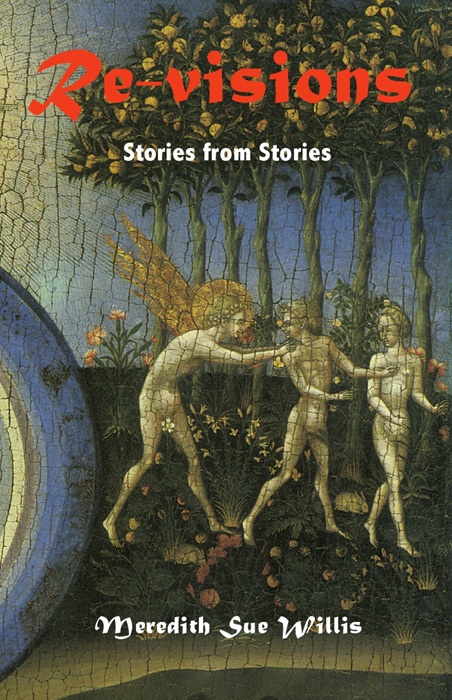
Click on the Book or here.
Re-visions: Stories from Stories is a collection of spin-offs from myth, fiction, and the Bible. From a new look at Adam and Eve and why they left the Garden to a grown-up Topsy from Uncle Tom's Cabin to the confessions of SaintAugustine's concubine- each story offers a gloss on the original as well as insights into how we canlive today.
Photos found on the various pages of this web site may be used by anyone,
but please attribute the source when it is specified.
This work is licensed under a Creative Commons Attribution-NonCommercial-ShareAlike 3.0 Unported License.


